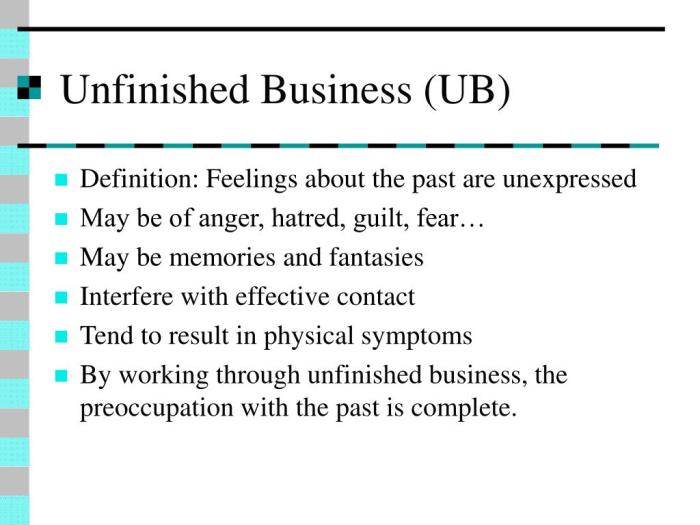As unfinished business in Gestalt therapy takes center stage, this opening passage beckons readers into a world crafted with expertise and clarity, ensuring a reading experience that is both absorbing and distinctly original. Delving into the depths of this therapeutic approach, we embark on a journey to explore the profound impact of unresolved issues on our mental and emotional well-being.
Gestalt therapy posits that unfinished business, those lingering emotional residues from past experiences, can manifest in various forms in our daily lives. They may surface as persistent feelings of guilt, shame, anger, or sadness that seem to have no apparent cause.
Understanding and addressing these unresolved issues is crucial for achieving personal growth and emotional liberation.
Concept of Unfinished Business in Gestalt Therapy

Gestalt therapy, a form of psychotherapy, emphasizes the importance of resolving unfinished business to promote psychological well-being. Unfinished business refers to unresolved issues, emotions, or experiences that linger from the past and continue to impact an individual’s present life.
Gestalt therapy is based on the principle that individuals are inherently whole and have the capacity for self-regulation and growth. Unfinished business arises when experiences are not fully processed or integrated into the individual’s life. These unresolved issues can manifest in various forms, such as unresolved conflicts, emotional blockages, or repetitive patterns of behavior.
Examples of unfinished business in everyday life include unresolved childhood experiences, unaddressed relationship issues, or traumatic events. Unresolved grief, anger, or guilt can also contribute to unfinished business. The impact of unfinished business on mental and emotional well-being can be significant, leading to anxiety, depression, relationship difficulties, and a sense of stagnation.
Identifying and Acknowledging Unfinished Business
Identifying areas of unfinished business is crucial for personal growth. Gestalt therapy employs various techniques to facilitate this process, such as:
- Awareness exercises:These exercises help individuals become more mindful of their thoughts, feelings, and bodily sensations, which can bring to light unresolved issues.
- Dream analysis:Dreams can provide insights into unconscious conflicts and unfinished business.
- Role-playing:By acting out unresolved situations, individuals can gain a deeper understanding of their emotions and motivations.
Acknowledging and owning unfinished business is essential for resolving it. This involves accepting responsibility for one’s own experiences and recognizing the impact of unresolved issues on the present.
Exploring and Processing Unfinished Business, Unfinished business in gestalt therapy
Exploring and processing unfinished business in therapy involves:
- Exploring the past:Examining the origins of unfinished business can help individuals understand its impact on their present lives.
- Processing emotions:Unresolved emotions need to be expressed and processed in a safe and supportive environment.
- Reframing perspectives:Gestalt therapy encourages individuals to challenge old beliefs and perspectives that may be perpetuating unfinished business.
The therapist-client relationship plays a vital role in resolving unfinished business. The therapist provides a safe and supportive environment, facilitates self-exploration, and challenges limiting beliefs.
Integrating Unfinished Business into the Present
Resolving unfinished business can lead to personal growth and transformation. By integrating unresolved issues into the present moment, individuals can:
- Gain self-awareness:Understanding unfinished business provides insights into one’s own motivations, values, and beliefs.
- Heal past wounds:Resolving unfinished business can heal emotional wounds and free individuals from the past.
- Create a more fulfilling present:By addressing unresolved issues, individuals can create a more meaningful and satisfying present life.
Practical tips for incorporating insights gained from resolving unfinished business into daily life include:
- Mindfulness:Practicing mindfulness can help individuals stay present and aware of their thoughts and feelings.
- Self-compassion:Being compassionate towards oneself can help individuals accept their past and move forward.
- Setting boundaries:Establishing healthy boundaries can protect individuals from re-experiencing unfinished business.
FAQ Section
What are the signs of unfinished business in Gestalt therapy?
Unfinished business can manifest in various ways, including persistent feelings of guilt, shame, anger, or sadness, difficulty letting go of past relationships or experiences, and recurring patterns of behavior that hinder personal growth.
How can I identify areas of unfinished business?
Techniques for identifying unfinished business include journaling, meditation, and dream analysis. Paying attention to your thoughts, feelings, and bodily sensations can also help you uncover unresolved issues.
What are the benefits of resolving unfinished business?
Resolving unfinished business can lead to personal growth, emotional healing, improved relationships, increased self-awareness, and a greater sense of purpose and fulfillment.

